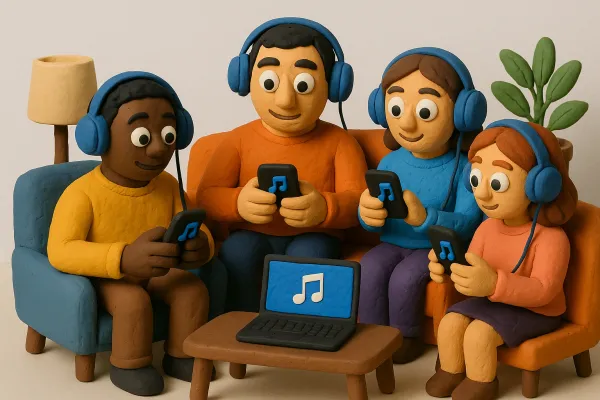Does Spotify Tell You Who Viewed Your Profile? Unveiling the Truth Behind Profile Privacy in 2025

Ever wondered if Spotify lets you see who's been checking out your profile? It's a pretty common question among users who are curious about their privacy on the platform. In 2025, this topic is still a hot one, especially with all the data Spotify collects to personalize your experience. Let’s break it all down and see what’s really going on with profile visibility and privacy.
Key Takeaways
- Spotify records a lot of your activity, but it doesn't share who views your profile.
- The platform uses your data to personalize music recommendations and ads.
- Spotify’s privacy policy explains data use, but most users overlook the details.
- Privacy concerns have grown as data collection practices evolve.
- You can tweak your settings to protect your privacy while using Spotify.
How Spotify Tracks Your Activity
What Data Does Spotify Collect?
Alright, let’s start with the basics: Spotify collects a lot of data. We’re talking about everything from what songs you listen to, how often you play them, and even how long you stick with a track before skipping. They also track your playlists, searches, and even your general location (don’t worry, it’s not super precise—just your region or country). Oh, and if you’re using the app on mobile, it might even pick up on the device type and network you’re on. Basically, if you’ve interacted with Spotify, they’ve probably logged it.
The Role of Algorithms in Personalization
Now, all that data isn’t just sitting there collecting dust. Spotify uses it to power its algorithms—the same ones that create your Discover Weekly or those "Made for You" playlists. These algorithms analyze your listening habits, like how often you replay a song or what genres you lean toward. It’s not just about music either; Spotify uses this info to suggest podcasts and even target ads. The goal? To make the experience feel tailored just for you. But let’s be real, it’s also about keeping you hooked so you keep coming back.
Privacy Concerns Around Data Tracking
Here’s where things get a little dicey. While personalization is great, the amount of data Spotify collects can feel a bit invasive. Some users worry about how much they’re sharing without even realizing it. For instance, do you know if Spotify shares your data with advertisers or third parties? Spoiler: they do. And while they claim it’s all anonymized, it still makes you wonder how much of your private listening habits are being used for profit. It’s a trade-off—convenience versus privacy—and not everyone’s comfortable with it.
At the end of the day, while Spotify’s data tracking helps create a personalized experience, it’s worth asking yourself: How much are you willing to share for the sake of convenience?
Spotify’s popularity is undeniable, with 47% of those aware of the brand actively using it. But with great power comes great responsibility—or at least, it should.
Understanding Spotify’s Privacy Policy
Key Points in the Privacy Policy
Spotify’s privacy policy is like that long manual you get with a new gadget—most of us don’t read it, but it’s packed with important details. Spotify collects a lot of data, from your playlists and listening habits to your location and even device details. They use this information to personalize your experience, like suggesting songs you might love or creating those "Made for You" playlists. But it’s not just about music; they also track how you interact with ads and other features on the platform.
Here’s a quick breakdown of what they collect:
- Listening habits: What you play, skip, or replay.
- Device info: Your phone or computer details.
- Location data: If you’ve enabled it, Spotify knows where you are.
- Interactions: How you click, scroll, or engage with the app.
How Transparent Is Spotify About Data Use?
Spotify is pretty open about what they do with your data, but let’s be real—most of us don’t dig into the fine print. They outline everything in their privacy policy, but it’s not exactly light reading. The company claims they collect data to improve your experience and keep the platform running smoothly. And while they don’t sell your data outright, they do share it with "partners"—which is a nicer way of saying advertisers and service providers.
Transparency-wise, they could do better. For example, explaining data use in plain, everyday language would go a long way. Right now, it feels a bit like you need a law degree to understand it all.
What Users Often Overlook
One thing most of us miss? Spotify’s policy changes over time, and they don’t always shout it from the rooftops. If you’re not paying attention, you might agree to new terms without realizing it. Another overlooked point is how much control you actually have. You can tweak your settings to limit data collection or even request to see what Spotify knows about you.
Here’s what you can do to stay on top of things:
- Check your privacy settings regularly.
- Review the policy updates when they pop up.
- Use tools like incognito mode if you don’t want your listening habits tracked.
Staying informed about Spotify’s privacy practices isn’t just about protecting your data—it’s about understanding how your habits shape your experience on the platform.
Oh, and starting April 9, 2025, new security requirements for Spotify integrations will kick in. Existing users will need to adjust too, so keep an eye out for updates.
Can You See Who Views Your Spotify Profile?
The Current State of Profile Visibility
Let’s cut to the chase: you can’t see who’s checking out your Spotify profile. Unlike some social media platforms, Spotify doesn’t notify you when someone views your profile or playlists. It’s just not part of their design. Sure, you can see your followers and who’s liked your playlists, but that’s about as far as it goes. If you’re curious about what your friends are listening to, you’ll need to check out the Friend Activity tab in the desktop app. Of course, that only works if they’ve chosen to share their activity.
Why Spotify Keeps This Information Private
Spotify’s decision not to share profile views is likely tied to privacy concerns. Imagine the chaos if everyone knew who was snooping on their playlists! It could discourage people from exploring new profiles or following others. Plus, Spotify’s focus is more on music discovery than social networking. They probably figure it’s better to keep things simple and avoid unnecessary drama.
User Reactions to Profile Privacy
Opinions on this are all over the place. Some users love the anonymity—no pressure, no judgment. Others wish they could see who’s been checking out their playlists, especially if they’re curating public ones. At the end of the day, it’s a trade-off: more transparency might mean less privacy. For now, Spotify seems to think the current setup works best for most users.
The Evolution of Spotify’s Data Practices
How Data Collection Has Changed Over Time
Spotify's approach to data collection has come a long way since its early days. Back in the late 2000s, it was mostly about tracking basic stuff—what songs we played, how often, and maybe some playlist activity. Fast forward to now, and they’re collecting everything from our listening habits to our locations and even how we interact with ads. It's like they've gone from keeping a diary to writing a full-on biography about us.
What’s wild is how detailed it’s gotten. For example:
- Every time you skip a song, they note it.
- If you play the same playlist on repeat, they know.
- Even the time of day you prefer certain genres doesn’t escape their radar.
This shift isn’t just about music anymore—it’s about understanding who we are as people.
The Impact of Privacy Regulations
Privacy laws have definitely made Spotify rethink how they handle our data. Remember when the EU hit them with that $5.4 million fine for not being transparent enough? That was a wake-up call. Since then, they’ve had to tighten up their policies and be more upfront about what they’re doing with our info.
Here’s a quick look at how regulations have shaped their practices:
| Year | Regulation/Incident | Outcome |
|---|---|---|
| 2018 | GDPR introduced in Europe | Spotify updated its privacy policies |
| 2019 | Accused of not disclosing data usage | Faced scrutiny from privacy watchdogs |
| 2023 | $5.4M fine for breaching EU rules | Increased transparency efforts |
It’s clear that these laws are forcing Spotify to balance personalization with respecting our privacy.
Lessons Learned from Past Controversies
Spotify’s had its fair share of bumps along the way. Remember when people freaked out in 2015 after a Spotify exec admitted they collect “an enormous amount of data”? That didn’t sit well with users. Then there was the whole backlash over how they track every little thing we do on the app. These controversies taught them a thing or two about transparency—or at least, they should have.
"If there’s one thing we’ve learned, it’s that users don’t like feeling spied on—even if it’s for better playlists."
To their credit, they’ve made some changes. They’ve added features like incognito mode and made it easier to adjust privacy settings. But let’s be real—there’s still a long way to go before most of us feel totally comfortable with how much they know about us.
Spotify's Privacy Hub is one step in the right direction, offering users a clearer view of how their data is handled. It’s not perfect, but it’s better than nothing.
Balancing Personalization and Privacy
Why Spotify Needs Your Data
Let’s be real—Spotify wouldn’t be Spotify without your data. Every playlist it recommends, every "Discover Weekly" gem, and even those oddly specific mood playlists (like "Songs to Cry to at 2 AM") are powered by the info it collects about you. Spotify uses your listening habits, search history, and even the times you use the app to create a super-personalized experience. This is why it feels like the platform "gets you." But, of course, this level of personalization comes at a cost—your data.
The Trade-Off Between Convenience and Security
Here’s the tricky part: the more data Spotify collects, the better your experience gets. But that also means you’re handing over a lot of personal information. It’s not just about what you listen to; it’s about when, where, and how often. This data can be used for things like targeted ads or, in some cases, even shared with advertising partners. While this might not bother some people, others might find it unsettling.
So, what’s the trade-off? Convenience versus security. If you want a tailored experience, you’re going to have to give up some privacy. But if you’re more of a "keep my data to myself" kind of person, you might have to sacrifice some of those cool features.
How Spotify Compares to Other Platforms
Spotify isn’t the only platform asking for your data. If you’ve ever used Netflix, Amazon, or even Facebook, you’ve likely noticed a similar pattern. But here’s the thing: Spotify tends to collect a lot more specific info about your habits. For example, it might analyze your listening patterns to figure out your mood or interests, which can feel a bit invasive. On the flip side, platforms like Netflix stick more to what you watch and when.
| Platform | Type of Data Collected | Personalization Level |
|---|---|---|
| Spotify | Listening habits, location, mood insights | High |
| Netflix | Viewing history, time of activity | Medium |
| Browsing history, interactions, interests | High |
There’s no one-size-fits-all answer here. It’s up to each of us to decide how much privacy we’re willing to trade for convenience.
Tips to Protect Your Privacy on Spotify
Adjusting Your Privacy Settings
Spotify gives us a lot of control over what we share, but it’s easy to overlook these settings. First off, head to your account settings and disable "Listening Activity" and "Recently Played Artists". This stops others from seeing what you’re jamming to. If you’ve connected your Spotify to social media accounts, consider unlinking them—this limits how much of your activity is shared outside the app.
Using Spotify in Incognito Mode
Ever heard of Spotify’s Private Session feature? It’s like incognito mode for your music. When you turn it on, Spotify won’t save your listening habits to its history. Perfect for those guilty pleasure playlists you don’t want anyone to know about. Just remember, it turns off automatically after a while, so you might need to re-enable it.
Third-Party Tools for Enhanced Privacy
There are apps and browser extensions out there designed to help manage your online privacy better, including on Spotify. These tools can block trackers or even anonymize your usage. Just make sure you’re downloading from a reputable source—no one wants to trade one privacy problem for another.
Protecting your privacy on Spotify doesn’t have to be complicated. Small changes, like tweaking settings or using Private Sessions, can make a big difference in keeping your listening habits to yourself.
If you want to keep your Spotify listening habits private, there are some easy steps you can take. Start by checking your privacy settings and make sure you know who can see your activity. Also, consider using a private session when you want to listen without sharing. For more tips on staying safe online, visit our website!
Wrapping It Up: Spotify and Your Privacy
So, does Spotify let you see who’s been checking out your profile? Nope, not yet. And honestly, it doesn’t seem like that’s changing anytime soon. While Spotify is all about giving you a personalized music experience, it’s also collecting a ton of data behind the scenes. Whether that’s a good thing or a little creepy depends on how you feel about privacy. At the end of the day, it’s up to you to decide if the trade-off is worth it. Just remember to keep an eye on those privacy settings and stay informed. After all, it’s your data, your call.
Frequently Asked Questions
Does Spotify let you see who viewed your profile?
No, Spotify does not allow users to see who has viewed their profile. This information is kept private by the platform.
What kind of data does Spotify collect about me?
Spotify gathers data like your listening habits, playlists, search history, and even your location if enabled. This helps them personalize your experience.
Can I use Spotify without sharing my personal data?
While you can adjust privacy settings to limit data sharing, some data collection is required for the platform to function properly.
How can I make my Spotify account more private?
You can tweak your privacy settings, use private session mode, and avoid linking third-party apps to your account for better privacy.
Why doesn’t Spotify show who visits my profile?
Spotify prioritizes user privacy and avoids sharing this kind of information to maintain a secure and private environment for all users.
Are there tools to enhance privacy on Spotify?
Yes, you can use third-party tools or browser extensions designed to boost privacy, but always ensure they are trustworthy before using them.





